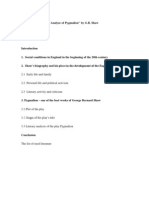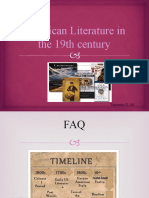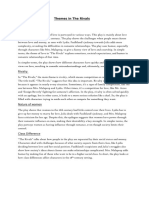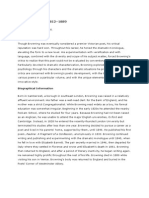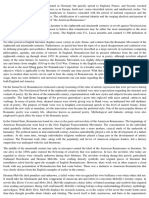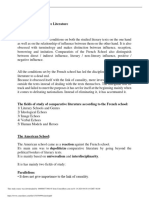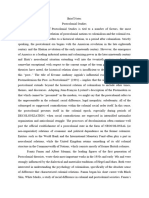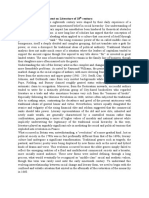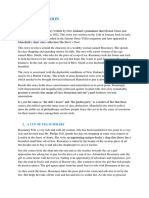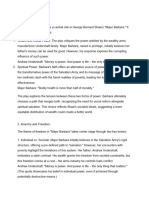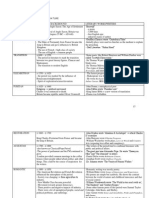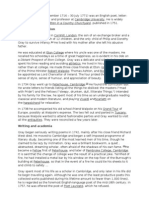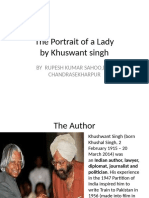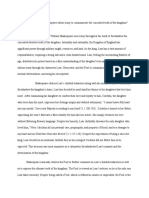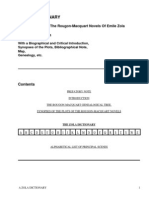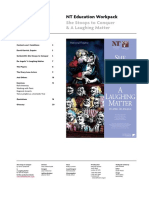Edwardian Literature
Edwardian Literature
Uploaded by
Raisa NervCopyright:
Available Formats
Edwardian Literature
Edwardian Literature
Uploaded by
Raisa NervCopyright
Available Formats
Share this document
Did you find this document useful?
Is this content inappropriate?
Copyright:
Available Formats
Edwardian Literature
Edwardian Literature
Uploaded by
Raisa NervCopyright:
Available Formats
Edwardian literature
sThe 20th century opened with great hope but also with some apprehension, for the new century marked the final approach to a new millennium. For many, humankind was entering upon an unprecedented era. H.G. Wellss utopian studies, the aptly titled Anticipations of the Reaction of Mechanical and Scientific Progress upon Human Life and Thought (1901) and A Modern Utopia (1905), both captured and qualified this optimistic mood and gave expression to a common conviction that science and technology would transform the world in the century ahead. To achieve such transformation, outmoded institutions and ideals had to be replaced by ones more suited to the growth and liberation of the human spirit. The death of Queen Victoria in 1901 and the accession of Edward VII seemed to confirm that a franker, less inhibited era had begun. Many writers of the Edwardian period, drawing widely upon the realistic and naturalistic conventions of the 19th century (upon Ibsen in drama and Balzac, Turgenev, Flaubert, Zola, Eliot, and Dickens in fiction) and in tune with the anti-Aestheticism unleashed by the trial of the archetypal Aesthete, Oscar Wilde, saw their task in the new century to be an unashamedly didactic one. In a series of wittily iconoclastic plays, of which Man and Superman (performed 1905, published 1903) and Major Barbara (performed 1905, published 1907) are the most substantial, George Bernard Shaw turned the Edwardian theatre into an arena for debate upon the principal concerns of the day: the question of political organization, the morality of armaments and war, the function of class and of the professions, the validity of the family and of marriage, and the issue of female emancipation. Nor was he alone in this, even if he was alone in the brilliance of his comedy. John Galsworthy made use of the theatre in Strife (1909) to explore the conflict between capital and labour, and in Justice (1910) he lent his support to reform of the penal system, while Harley Granville-Barker, whose revolutionary approach to stage direction did much to change theatrical production in the period, dissected in The Voysey Inheritance (performed 1905, published 1909) and Waste (performed 1907, published 1909) the hypocrisies and deceit of upper-class and professional life. Many Edwardian novelists were similarly eager to explore the shortcomings of English social life. Wellsin Love and Mr. Lewisham (1900); Kipps (1905); Ann Veronica (1909), his prosuffragist novel; and The History of Mr. Polly (1910)captured the frustrations of lower- and middle-class existence, even though he relieved his accounts with many comic touches. In Anna of the Five Towns (1902), Arnold Bennett detailed the constrictions of provincial life among the self-made business classes in the area of England known as the Potteries; in The Man of Property (1906), the first volume of The Forsyte Saga, Galsworthy described the destructive possessiveness of the professional bourgeoisie; and, in Where Angels Fear to Tread (1905) and The Longest Journey (1907), E.M. Forster portrayed with irony the insensitivity, self-repression, and philistinism of the English middle classes. These novelists, however, wrote more memorably when they allowed themselves a larger perspective. In The Old Wives Tale (1908), Bennett showed the destructive effects of time on the lives of individuals and communities and evoked a quality of pathos that he never matched in his other fiction; in Tono-Bungay (1909), Wells showed the ominous consequences of the
uncontrolled developments taking place within a British society still dependent upon the institutions of a long-defunct landed aristocracy; and in Howards End (1910), Forster showed how little the rootless and self-important world of contemporary commerce cared for the more rooted world of culture, although he acknowledged that commerce was a necessary evil. Nevertheless, even as they perceived the difficulties of the present, most Edwardian novelists, like their counterparts in the theatre, held firmly to the belief not only that constructive change was possible but also that this change could in some measure be advanced by their writing. Other writers, including Thomas Hardy and Rudyard Kipling, who had established their reputations during the previous century, and Hilaire Belloc, G.K. Chesterton, and Edward Thomas, who established their reputations in the first decade of the new century, were less confident about the future and sought to revive the traditional formsthe ballad, the narrative poem, the satire, the fantasy, the topographical poem, and the essaythat in their view preserved traditional sentiments and perceptions. The revival of traditional forms in the late 19th and early 20th century was not a unique event. There were many such revivals during the 20th century, and the traditional poetry of A.E. Housman (whose book A Shropshire Lad, originally published in 1896, enjoyed huge popular success during World War I), Walter de la Mare, John Masefield, Robert Graves, and Edmund Blunden represents an important and often neglected strand of English literature in the first half of the century. The most significant writing of the period, traditionalist or modern, was inspired by neither hope nor apprehension but by bleaker feelings that the new century would witness the collapse of a whole civilization. The new century had begun with Great Britain involved in the South African War (the Boer War; 18991902), and it seemed to some that the British Empire was as doomed to destruction, both from within and from without, as had been the Roman Empire. In his poems on the South African War, Hardy (whose achievement as a poet in the 20th century rivaled his achievement as a novelist in the 19th) questioned simply and sardonically the human cost of empire building and established a tone and style that many British poets were to use in the course of the century, while Kipling, who had done much to engender pride in empire, began to speak in his verse and short stories of the burden of empire and the tribulations it would bring. No one captured the sense of an imperial civilization in decline more fully or subtly than the expatriate American novelist Henry James. In The Portrait of a Lady (1881), he had briefly anatomized the fatal loss of energy of the English ruling class and, in The Princess Casamassima (1886), had described more directly the various instabilities that threatened its paternalistic rule. He did so with regret: the patrician American admired in the English upper class its sense of moral obligation to the community. By the turn of the century, however, he had noted a disturbing change. In The Spoils of Poynton (1897) and What Maisie Knew (1897), members of the upper class no longer seem troubled by the means adopted to achieve their morally dubious ends. Great Britain had become indistinguishable from the other nations of the Old World, in which an ugly rapacity had never been far from the surface. Jamess dismay at this condition gave to his subtle and compressed late fiction, The Wings of the Dove (1902), The Ambassadors (1903), and The Golden Bowl (1904), much of its gravity and air of disenchantment. Jamess awareness of crisis affected the very form and style of his writing, for he was no longer assured that the world about which he wrote was either coherent in itself or unambiguously
intelligible to its inhabitants. His fiction still presented characters within an identifiable social world, but he found his characters and their world increasingly elusive and enigmatic and his own grasp upon them, as he made clear in The Sacred Fount (1901), the questionable consequence of artistic will. H.H. Munro [pseudonym Saki] (1870-1916), prolific Scottish author of the Edwardian era, often referred to as the master of short stories and compared to O Henry and Dorothy Parker.
Another expatriate novelist, Joseph Conrad (pseudonym of Jzef Teodor Konrad Korzeniowski, born in the Ukraine of Polish parents), shared Jamess sense of crisis but attributed it less to the decline of a specific civilization than to human failings. Man was a solitary, romantic creature of will who at any cost imposed his meaning upon the world because he could not endure a world that did not reflect his central place within it. In Almayers Folly (1895) and Lord Jim (1900), he had seemed to sympathize with this predicament; but in Heart of Darkness (1902), Nostromo (1904), The Secret Agent (1907), and Under Western Eyes (1911), he detailed such imposition, and the psychological pathologies he increasingly associated with it, without sympathy. He did so as a philosophical novelist whose concern with the mocking limits of human knowledge affected not only the content of his fiction but also its very structure. His writing itself is marked by gaps in the narrative, by narrators who do not fully grasp the significance of the events they are retelling, and by characters who are unable to make themselves understood. James and Conrad used many of the conventions of 19th-century realism but transformed them to express what are considered to be peculiarly 20th-century preoccupations and anxieties.
You might also like
- A Tale of Two Cities: Charles Dic KensDocument6 pagesA Tale of Two Cities: Charles Dic KensAlshabi AliNo ratings yet
- Analyze of PygmalionDocument28 pagesAnalyze of PygmalionVhe Vena S100% (2)
- Eveline by James Joyce PDFDocument2 pagesEveline by James Joyce PDFRobert0% (4)
- Učimo Engleski Od Slike Do Rečenice - Marija Knežević I Biljana MilatovićDocument14 pagesUčimo Engleski Od Slike Do Rečenice - Marija Knežević I Biljana MilatovićIzdavačka kuća "Jasen"100% (1)
- What Is Jazz in Toni Morrison'sDocument8 pagesWhat Is Jazz in Toni Morrison'sAnonymous SPi3X6MNo ratings yet
- Styles: Parody and BurlesqueDocument3 pagesStyles: Parody and BurlesqueSiva KumaravelNo ratings yet
- The Tortoise and The Hare - Extended - PDFDocument2 pagesThe Tortoise and The Hare - Extended - PDFوئام زروقNo ratings yet
- A School Project On Rise of The NovelDocument3 pagesA School Project On Rise of The Novelsanjaybantu100% (1)
- Anglo-Norman Period (1066-1350)Document27 pagesAnglo-Norman Period (1066-1350)Mathews Sajit50% (2)
- Soldier's HomeDocument35 pagesSoldier's HomeGiang Hoàng VũNo ratings yet
- The Edwardian Period (1901 - 1914)Document4 pagesThe Edwardian Period (1901 - 1914)MaikoNo ratings yet
- Alienation and Isolation in HemingwayDocument9 pagesAlienation and Isolation in HemingwaydijnanaNo ratings yet
- American Literature in The 19th CenturyDocument16 pagesAmerican Literature in The 19th CenturyDiana Tatarenko100% (1)
- محاضرات نحو تحويلي رابع اداب انكليزيDocument112 pagesمحاضرات نحو تحويلي رابع اداب انكليزيZahraa KhalilNo ratings yet
- Themes of The RivalsDocument1 pageThemes of The RivalsHeart BrokenNo ratings yet
- Robert Browning PoetryDocument4 pagesRobert Browning PoetrypelinNo ratings yet
- Rip Van WinkleDocument7 pagesRip Van Winkleandrea romero lopezNo ratings yet
- 4 The Classification and Types of ESPDocument2 pages4 The Classification and Types of ESPRaouf Carlo100% (2)
- Heaney - From The Frontier of Writing AnalysisDocument2 pagesHeaney - From The Frontier of Writing Analysistatum100% (2)
- Modern LiteratureDocument17 pagesModern LiteratureGledis GjuziNo ratings yet
- Seventeenth Century ProseDocument8 pagesSeventeenth Century ProseSo RemNo ratings yet
- Romanticism in American LiteratureDocument2 pagesRomanticism in American LiteraturesunnysNo ratings yet
- Schools PDFDocument8 pagesSchools PDFSayed AbuzeidNo ratings yet
- Slips of The EarDocument9 pagesSlips of The EarMichael SmithNo ratings yet
- Stylistic Analysis of Langston Hughes's Poem "Harlem" Lok Raj SharmaDocument10 pagesStylistic Analysis of Langston Hughes's Poem "Harlem" Lok Raj SharmaRizwan khanNo ratings yet
- أسئلة وأجوبة لمادة الأدب الإنجليزي القرن السابع عشرDocument48 pagesأسئلة وأجوبة لمادة الأدب الإنجليزي القرن السابع عشرpapar58954No ratings yet
- Russian FormalismDocument11 pagesRussian FormalismSania MustafaNo ratings yet
- Plato LiteratureDocument34 pagesPlato LiteratureIan BlankNo ratings yet
- PDFDocument41 pagesPDFCristina Florina IonescuNo ratings yet
- A Brief History of Russian FormalismDocument9 pagesA Brief History of Russian FormalismpanparasNo ratings yet
- 1 Literary Periods of British and American Literature 1 1Document6 pages1 Literary Periods of British and American Literature 1 1ikramNo ratings yet
- Brief Notes Postcolonial StudiesDocument8 pagesBrief Notes Postcolonial Studiesawtshfhd100% (1)
- John Milton Text and ActivitiesDocument8 pagesJohn Milton Text and Activitiespamela aroniNo ratings yet
- Shakespeare ReportDocument5 pagesShakespeare Reportapi-275033668No ratings yet
- SocioDocument24 pagesSocioGovt. Tariq H/S LHR CANT LAHORE CANTTNo ratings yet
- Regional and Social Dialects A. Regional Variation 1. International VarietiesDocument3 pagesRegional and Social Dialects A. Regional Variation 1. International VarietiesRiskaNo ratings yet
- 2 6 17 357 PDFDocument3 pages2 6 17 357 PDFfrielisa frielisaNo ratings yet
- Notes Gullivers TravelsDocument4 pagesNotes Gullivers TravelsJennifer LawrenceNo ratings yet
- British Literature StudiesDocument16 pagesBritish Literature StudiesAlena KNo ratings yet
- American LiteratureDocument3 pagesAmerican LiteratureYhazmin Iris IlustrisimoNo ratings yet
- Effect of Social Development On Literature of 18th CenturyDocument2 pagesEffect of Social Development On Literature of 18th CenturyZahid HasanNo ratings yet
- A Cup of Tea NotesDocument7 pagesA Cup of Tea Notesskhanmerali7100% (1)
- Major ThemesDocument9 pagesMajor Themesjaam90001No ratings yet
- Realism in American LiteratureDocument3 pagesRealism in American LiteraturePopescu Pompiliu-IonNo ratings yet
- ArabyDocument16 pagesArabyrsigue_1100% (1)
- Oscar Wilde Biography and Historical BackgroundDocument3 pagesOscar Wilde Biography and Historical BackgroundImam Mahroja HakimNo ratings yet
- Filling Station - Elizabeth BishopDocument14 pagesFilling Station - Elizabeth BishopTadhg MccarthyNo ratings yet
- Analysis of Importance of Being Earnest Act 2Document9 pagesAnalysis of Importance of Being Earnest Act 2swairaNo ratings yet
- Outline of English LiteratureDocument3 pagesOutline of English LiteratureValdilene Santos Rodrigues Vieira100% (1)
- JAZZDocument10 pagesJAZZKai MalikNo ratings yet
- THESISDocument63 pagesTHESISrochelle mantesNo ratings yet
- A Critical Evaluation of Dr. Johnson's Views On Paradise LostDocument6 pagesA Critical Evaluation of Dr. Johnson's Views On Paradise LostAnonymous CwJeBCAXpNo ratings yet
- Literary Periods & MovementsDocument26 pagesLiterary Periods & MovementsChihaya AyaseNo ratings yet
- Americanism SDocument26 pagesAmericanism SAni MkrtchyanNo ratings yet
- Thomas GreyDocument22 pagesThomas GreyOana HațeganNo ratings yet
- Look Back in AngerDocument23 pagesLook Back in AngerManoj KanthNo ratings yet
- Origin and Development of LyricDocument24 pagesOrigin and Development of LyricBhumit Chudasama100% (1)
- Romanticism BLAKEDocument6 pagesRomanticism BLAKEgfmilhomeNo ratings yet
- The Development of The NovelDocument44 pagesThe Development of The NoveljagubaNo ratings yet
- Jane EyreDocument13 pagesJane EyreShirin AfrozNo ratings yet
- Study Guide to Long Days Journey into Night by Eugene O'NeillFrom EverandStudy Guide to Long Days Journey into Night by Eugene O'NeillNo ratings yet
- Life IN PILIDocument12 pagesLife IN PILIJay R Joseph Garcia0% (1)
- Literature ReviewerDocument7 pagesLiterature ReviewerLovelle Pirante OyzonNo ratings yet
- Speak Out Uppintermediate ScopeDocument2 pagesSpeak Out Uppintermediate ScopeadelebookNo ratings yet
- Parts of SpeechDocument3 pagesParts of Speechaamir.saeedNo ratings yet
- The Greatest GiftDocument5 pagesThe Greatest GiftBrad RiggsNo ratings yet
- How Philosophers Saved Myths - ZulickDocument6 pagesHow Philosophers Saved Myths - ZulickRaul A. BurneoNo ratings yet
- Three Complete Novels The Endearment Bitter Sweet Forgiving by LaVyrle SpencerDocument1 pageThree Complete Novels The Endearment Bitter Sweet Forgiving by LaVyrle Spencerversimilitude0% (2)
- RomanticismDocument40 pagesRomanticismsherry3719qaoNo ratings yet
- 3rd Prep - First UnitsDocument2 pages3rd Prep - First UnitsDr Hassan MoustafaNo ratings yet
- DeGuire MaryDocument325 pagesDeGuire MaryMichel FoucaultNo ratings yet
- Four Square WritingDocument11 pagesFour Square WritingSujan AcharyaNo ratings yet
- Eighth - Cycle - Quiz - 01 Marjorie Ururi OreDocument3 pagesEighth - Cycle - Quiz - 01 Marjorie Ururi OreTabatha Velarde ValenciaNo ratings yet
- PaideiaDocument3 pagesPaideiaffergomNo ratings yet
- 3125 01 INS 2RP AFP tcm142-699274Document4 pages3125 01 INS 2RP AFP tcm142-699274Mennatullah Soliman100% (1)
- On The Portrait of A LadyDocument12 pagesOn The Portrait of A Ladyjainn.bhumikaa2000No ratings yet
- Script HamletDocument4 pagesScript HamletLynNo ratings yet
- Literature Presentation by Yasmine RamosDocument76 pagesLiterature Presentation by Yasmine Ramosenimsay somarNo ratings yet
- King Lear EssayDocument3 pagesKing Lear Essayapi-567701694No ratings yet
- The Year of Sharing Book Activities AnswersDocument2 pagesThe Year of Sharing Book Activities AnswersEliezer Joel Choque Gómez67% (3)
- Horace&Juvenal SummerDocument38 pagesHorace&Juvenal SummerAntonio BrandãoNo ratings yet
- 12 English - Should Wizard Hit Mommy - NotesDocument4 pages12 English - Should Wizard Hit Mommy - NotesAarohi SharmaNo ratings yet
- HUM105+WK1+Johnson-Foundations+of+Mythology Teacher GradedDocument3 pagesHUM105+WK1+Johnson-Foundations+of+Mythology Teacher GradedDarlean JohnsonNo ratings yet
- A Zola Dictionary: by J. G. PattersonDocument164 pagesA Zola Dictionary: by J. G. PattersonGutenberg.org100% (1)
- Symbolism in Heart of DarknessDocument5 pagesSymbolism in Heart of Darknesssemona ExoLNo ratings yet
- The Bard's Tale (Original) - ManualDocument18 pagesThe Bard's Tale (Original) - ManualNick LandryNo ratings yet
- Early Life: Suchitra MitraDocument2 pagesEarly Life: Suchitra MitraNilãshis ÐuttåNo ratings yet
- She Stoops Laughing MatterDocument23 pagesShe Stoops Laughing Matterscribdguru2No ratings yet

